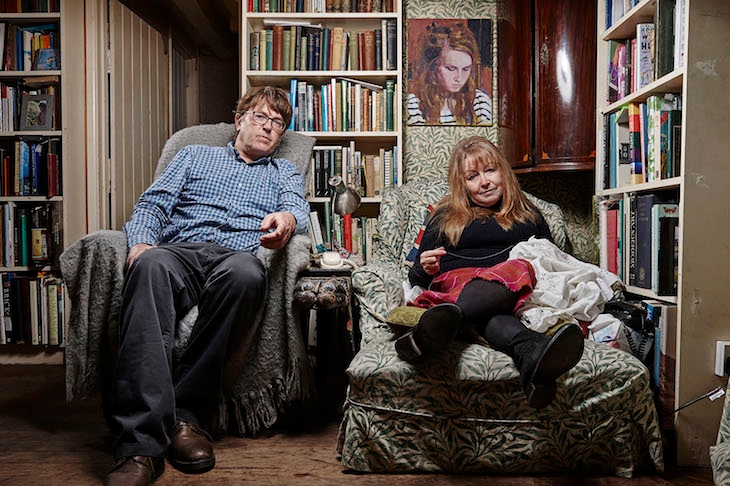If you don’t yet watch Gogglebox on Channel 4, start doing so now. Far from making you despise our couch-potato nation, it will make you feel great affection for it. Sprawled on L-shaped sofas with comfort cushions or slobbering dogs on their tummies, or sitting side by side on armchairs with a vase of carnations on a doily between them, the programme’s chosen telly-watchers make what must be the most unselfconscious, and therefore genuine, remarks spoken by anyone on air.
There’s no doubt in my mind that Giles and Mary are the most watchable of all the watchers. ‘Meanwhile, in Wiltshire…’ says the narrator, and you glimpse a thatched cottage, and then the camera homes in on Giles Wood and Mary Killen frowning side by side on two armchairs with books (at last!) in the background. Giles says something laconic and spot-on, which doesn’t make Mary laugh. Without looking at him she reminds him to check the Volvo for oil as two of their cars have died thanks to Giles forgetting to check the oil. Or she pleads with him to desist from burning the junk mail as some of it isn’t junk.
I remember when a tornado ripped off a row of garage roofs in Selsey in West Sussex and you saw an aerial shot of what was inside them. (Not cars, of course.) Gogglebox is a bit like that. It reveals what goes on deep inside people’s marriages and family lives. This Gogglebox spin-off book, The Diary of Two Nobodies, is required reading for anyone who (a) craves the Giles and Mary moments on Gogglebox and longs to know more about their domestic life, (b) savours Mary’s ‘Your problems solved’ column in The Spectator and seeks the guidance of her Northern Irish wisdom, (c) is nosey about how other couples manage to hold down long marriages, and (d) can’t help being fascinated by Giles Wood’s particularly cussed, antisocial take on life.
An underachieving artist, he is proud of the high number of blockbuster exhibitions he has missed in his lifetime. He shuns company, finding it emotionally draining. ‘I’ve often thought of harnessing the data in the Visitors’ Book,’ Giles writes, ‘to produce a bar chart of what would prove to be diminishing guest numbers over the years.’
‘People talk about the school of life,’ writes Mary, ‘but Giles has never attended that school.’ Giles, whose charming pen-and-ink drawings illustrate this book, has never had a proper job, although he collects office furniture. When a journalist from Wiltshire Life asked him recently what he’d done in the past ten years, he had to bellow upstairs to Mary, ‘Mary, apart from mending the windows, what have I done in the last ten years?’
‘Giles can watch an episode of University Challenge and get 17 questions right,’ writes Mary. ‘But he can also be inexplicably dim-witted from time to time. We call this Variable Intelligence Disorder.’ She suggests that he belongs to Densa rather than Mensa.
This diary of a year, written in turns by them both, is an anatomy of a marriage and a catalogue of exasperation. Mary hates the noise Giles’s anorak makes when he wears it. Giles can’t bear it when Mary tips the whole contents of her bag on to the station platform when looking for something.
Mary likes going to London for parties and Giles hates it. After they come home from a wedding, Giles has an attack of what Mary calls his ‘negorrhea’: he searches for negative things he can ‘harvest’ from the wedding experience. ‘Giles loves negative news,’ Mary writes. ‘He keeps a mental compendium of things that have gone wrong for friends and family.’
Such family words are so good that they should be adopted nationally. Another is ‘graddexe’: a house or flat for the Generation Rent graduate child who can’t get on to the property ladder. (They’re thinking of building one in their field.) ‘Pandora’s Boxing’ is when they’re struggling to sort out one problem, ‘but instead of concentrating on it, Giles tries to think of all the other problems we’ve got and mention them as well.’
Divorce is very much not on the agenda. ‘I like to think,’ writes Giles, ‘that by not divorcing, we are bucking the trend.’ He does like to buck a trend. Both of them use television imagery to explain their non-divorcing philosophy. Mary writes that they were brought up in the pre-video and DVD age ‘when there was no alternative to “sitting out” a programme’. ‘As on telly, so in life.’ For Giles, ‘The Mastermind mantra “I’ve started so I’ll finish” has always seemed to me a powerful bulwark against divorce.’
Please stick it out, Giles and Mary. We can discern your deep compatibility, wrapped up inside those layers and layers of incompatibilty.






Comments